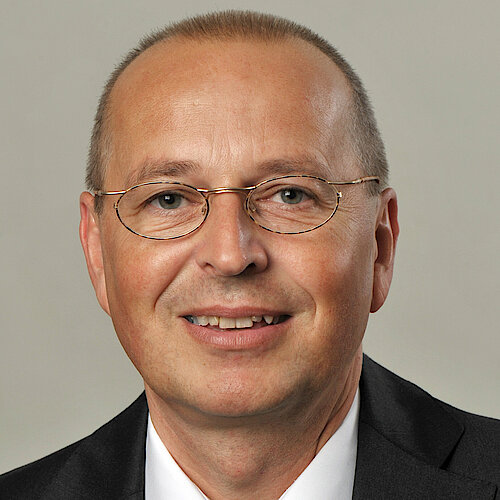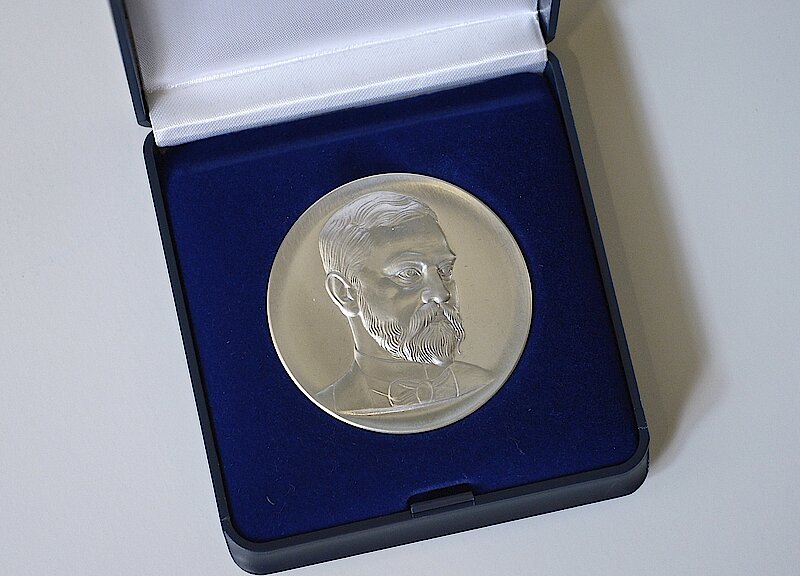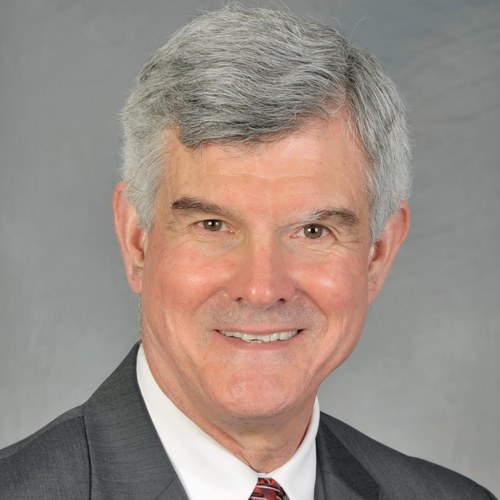Die Heyn-Denkmünze ist die höchste Auszeichnung der DGM. Benannt nach dem ersten DGM-Vorsitzenden Emil Heyn, wird sie für jene Leistungen auf dem Gebiet der Materialwissenschaft und Werkstofftechnik verliehen, durch die wesentliche Fortschritte in wissenschaftlicher, technologischer oder wirtschaftlicher Hinsicht erzielt werden konnten. Wie mit den anderen von ihr verliehenen Preisen, will die DGM auch mit der Heyn-Denkmünze auf exzellente Entwicklungen im Fachgebiet aufmerksam machen. Durch die Heyn-Denkmünze kann insbesondere das Lebenswerk einer herausragenden Persönlichkeit gewürdigt werden. Nominierte sollten in der Regel persönliches DGM-Mitglied sein.
Die Heyn-Denkmünze wird in diesem Jahr an Prof. Dr. Klaus Jandt und Prof. Dr. Georg Pharr verliehen.
Laudatio für Prof. Dr. Klaus Jandt
von Prof. Dr. David Watts
It is my great pleasure and honour, to provide this laudation for Prof. Dr. Klaus D. Jandt on the occasion of the award of the Heyn-Denkmünze.
From the beginning of his career, Prof. Jandt has made outstanding innovative contributions to the field of materials science, through which significant advances have been achieved in both scientific and technological terms in the true spirit of the Heyn-Denkmünze.

Prof. Klaus D. Jandt is an exceptional and internationally leading materials scientist, the incumbent Chair of Materials Science at Friedrich Schiller University Jena and a distinguished senior scientist, scholar, mentor, inventor and dedicated university teacher.
Prof. Jandt studied physics in Hamburg and received his Dr. rer. nat. in materials science for his work “Investigation of polymer-metal epitaxy in computer simulation and experiment” from Hamburg University of Technology (TUHH) under the guidance of Prof. Dr. J. Petermann.
Inspired by work in nanomaterials and nanocrystals, sustainability/ “green” materials, polymers and atomic force microscopy, Prof. Jandt developed an independent and highly innovative research program focusing on biomaterials, nanomaterials, and polymer composites. Prof. Jandt recognized earlier than others the connection between the materials structure and properties of biomaterials - such as biopolymers - from a materials science perspective.
As a doctoral researcher he was one of the pioneers in nano structural investigations of semicrystalline polymers with novel scanning probe microscopes. He introduced the first STM at the TUHH in Hamburg. He was one of the first to investigate the surface nanostructure of polymer-metal interfaces with AFM.
As a Humboldt-Feodor-Lynen fellow at Cornell University, NY, USA, he and his coworkers unraveled the nanostructure and the microstructural evolution of novel melt-intercalated polymer-organically-modified layered silicate nanocomposites using HRTEM methods. These materials have attracted great interest, both in industry and in academia because they often show remarkable improvement in material properties when compared with polymers or conventional micro-composites. Prof. Jandt’s papers have become standard works in this area and are frequently cited.
The pioneering concept for the use of the blue LED (light emitting diode) as a photo-polymerization device for oral biomaterials is attributed to Prof. Jandt and his coworkers. LED technology is significantly more efficient than the previous quartz tungsten halogen (QTH) curing lights, producing less heat and requiring less overall energy to power. This enables the use of battery-operated visible-light photopolymerization throughout both dental clinics and processing laboratories. It is impossible to overstate the importance of his discovery and its continued translation into the daily practice of dental materials technology that has led to a rapid and profound change in widely accepted paradigms. The details of this innovation and patents and their significance have been documented in “A Brief History of LED Photopolymerization”.
Jandt creatively built upon the original invention - of efficient blue light-emitting diodes, enabling bright and “green” energy-saving white light sources - for which the 2014 Nobel Prize in physics was awarded to I. Akasaki, H. Amano and S. Nakamura. A literature search in Web of Science shows that there have been more than 1000 published articles related to LED light curing over the past 20 years and Prof. Jandt remains its most prolific and most-cited researcher. This revolutionary technology for biomaterials represents a definitive example of successful translational research that is now used globally by millions of clinical practitioners every day. Jandt’s foundational LED work stimulated much subsequent research and inventions from others, including the multi-wave curing lights that have become so popular today. The world-renowned German Optical Museum presented Prof. Jandt’s first dental LED light-cure unit in a special exhibition.
Prof. Jandt’s groundbreaking contributions to the advance of biomaterials science are legendary. He is one of the first materials scientists to recognize the immense impact that materials surface nanostructures of titanium and semicrystalline polymers have on biomolecules and cells. Prof. Jandt and his team discovered that protein adsorption can be controlled by materials nanostructures and his work elucidated the physical mechanisms behind this, which in turn facilitates control of cellular reactions to materials. This established the foundation for future designs of more biocompatible materials and has major implications for materials / life-science interfaces beyond classic biomaterials. His work: Does the nanometer scale topography of titanium influence protein adsorption and cell proliferation? is among the most frequently cited papers in this research field.
For his trailblazing work How the surface nanostructure of polyethylene affects protein assembly and orientation, published in ACS Nano, he received the Thuringia Research Award 2011 for Applied Research. Together with his colleague Daniel Schwarz in Boulder, Colorado, he succeeded in imaging and understanding the microscopic dynamics of adsorbed fibrinogen on nanostructured polymer surfaces. In recent years, Prof. Jandt and his team designed and created groundbreaking hybrid protein nanofiber materials by molecular self-assembly. These are expected to be universal building blocks for an entirely new class of biomaterials with tailored properties.
Due to limited space, I can mention only briefly his further major contributions. These include novel polymer-CNT nanocomposites with an extremely high degree of CNT orientation, intelligent temperature responsive hydrogels for drug delivery and the introduction of nano layer-by-layer functionalization of titanium for promoting bone cell growth. Recently, Prof. Jandt developed a strong research program in the emerging area of antimicrobial biomaterials. According to Google Scholar Prof. Jandt is the second most cited researcher in this area worldwide.
Prof. Jandt is a PI in the DFG Collaborative Research Center 1278 PolyTarget, where he develops new polymer nanoparticles as drug carriers for fighting inflammation. He is the founder and chairperson of the DGM panel of experts (Fachausschuss) biomaterials, was scientific speaker of all DGM panels of experts (Fachausschüsse) from 2013-2016 and a member of the DGM Board. Based on the tremendous success of his new biomaterials panel of experts, he initiated together with Wiley VCH publishing company the new Advanced Biomaterials Section of the international journal Advanced Engineering Materials. This successful journal section laid the foundation for the internationally renowned journal Advanced Healthcare Materials where Prof. Jandt served for several years as founding editorial board member. Prof. Jandt is editorial board member of the international journals Acta Biomaterialia, Dental Materials and Colloids and Surfaces B: Biointerfaces.
He is founder and chairperson of the international conference BioMAT of the DGM and made numerous valuable contributions to the DGM. The BioMAT has a special mission of promoting young future leaders in biomaterials science and engineering. Prof. Jandt is a key person in the DGM for the area of biomaterials and his leadership in this area helped to attract several new young members to the DGM.
Prof. Jandt is a dedicated university teacher who educated hundreds of science and engineering students in materials science, polymers and biomaterials at leading universities. In 2019, he received the Teaching Award Certificate Professionalism in Teaching and Leadership, of Friedrich Schiller University Jena. From Prof. Jandt’s groups, ten professors have emerged, now working at universities world-wide. Prof. Jandt’s international recognition is evident from numerous invited talks to international conferences. For several years he has also been a member of European Research Council (ERC) panels. He is a founding member of the new ERC Panel 11 Materials Engineering established in 2021. His research is frequently cited (h-index 67, 16.700 citations) and is published in Q1 (top impact) journals. Prof. Jandt’s research is characterized by both great originality and high scientific relevance.
The year 2022 was another highlight of Prof. Jandt’s career in materials science: he received the IADR Distinguished Scientist Wilmer Souder Award, USA and the Batsheva de Rothschild Fellow Award of Israel. In 2023 he received a large grant of the German Science Foundation (DFG) for the new research training group Materials-Microbe-Microenvironments (DFG RTG 2723), all showing that he is an international leading materials scientist, extremely worthy for the Heyn-Denkmünze.
His altruism is underlined for example by his engagement as spokesperson of the Jena regional group of the German-Humboldt Network, voluntary science projects with school adolescents or expert referee work for Jugend Forscht projects. Furthermore, Prof. Jandt is continually active in engaging the public for better understanding of materials science and engineering as evident from several “Saturday Lectures of Science” for the public, his engagement in “Long Nights of Science” and several press releases and tv and radio appearances.

In summary, Prof. Jandt has achieved outstanding advances in key areas of materials science which drew attention to the excellent developments in this field in the spirt of the Heyn-Denkmünze. These advances are of considerable importance for basic scientific understanding and for societal technological benefit. The Heyn-Denkmünze for Prof. Jandts honors his life's work of an outstanding personality.
Laudatio für Prof. Dr. Georg Pharr
von Prof. Dr. Mathias Göken, Prof. Dr. Gunther Eggeler, Prof. Dr. Karsten Durst, Prof. Dr. Gerhard Dehm
With its highest award, the Heyn Memorial Medal. Prof. George M. Pharr from Texas A&M University has shaped the field of nanomechanics like no other scientist in the world. His groundbreaking contributions to the development of the nanoindentation technology are the basis for a broad variety of applications in all fields of materials science. In his long scientific career, George Pharr has maintained a very lively exchange with many scientists in Germany and thus greatly influenced research activities in the DGM environment. His continuous support of younger scientists was very important for the development of nanomechanics worldwide and within Germany.

George Pharr received a Bachelor degree in Mechanical Engineering from Rice University, Houston, Texas in 1975. After that, he briefly worked as a research assistant at the Los Alamos Scientific Laboratory before deepening his scientific knowledge at Stanford University with a Master's and PhD in Materials Science & Engineering. He completed his doctorate at Stanford under the supervision of Prof. William D. Nix (Heyn Medal in 2011) in 1979. In his doctoral work he focused in particular on the mechanical behavior of materials at high temperatures, creep of solid solutions and modeling of the mechanical behavior. He then went to Cambridge University, UK, for two years as a postdoc with Mike F. Ashby (Heyn Medal in 2003), where he worked on the influence of grain boundaries on creep. In 1980 he was appointed assistant professor of Materials Science back at Rice University, where he later was promoted to an associate and full professor and worked for a total of 18 years. After that, he took up a joint faculty appointment at the University of Tennessee (UT) and the Oak Ridge National Laboratory (ORNL) where he again stayed for 18 years. He had a formative influence on the development of the University as a department chair etc. In recognition of this service, he was recently inducted into the UT departmental Hall of Fame. In 2017, George Pharr received an honorary appointment as the Erle Nye ’59 Chair I in the Department of Materials Science and Engineering at Texas A&M University, where he helped establishing the MSE Department. In 2022 George Pharr was named University Distinguished Professor, which is the highest faculty honor at Texas A&M. The distinction is given to faculty members who are considered pre-eminent in their field and have made transformational contributions to their discipline.
In his long scientific career Prof. George M. Pharr has worked on the mechanical behavior of a wide variety of material groups, such as ceramics, biomaterials and metals in general. In the beginning of the 1990s he recognized how helpful indentation studies could be. He was probably one of the first to recognize the generality of the connection between contact stiffness, contact area and elastic material properties. This was an important starting point for the development of the world-famous work on the nanoindentation technique published in 1992 in the Journal of Materials Research, which we all know as the Oliver-Pharr method. This legendary paper is one of the most cited papers in Materials Science with more than 30.000 citations. He published this work together with Warren Oliver, who, as an instrumental specialist, developed the first commercial nanoindenter. This long lasting and still ongoing collaboration and friendship was extremely fruitful for the development of the field of nanomechanics, which has now achieved exceptional importance in practically all fields of material science.
Nanoindentation was initially developed for electronics. In the 1990s, the importance of nanoindentation grew with the boom of the semiconductor industry. Pharr assisted with the creation of a thin film that covers the disks in hard drives. The magnetic material on these disks, where data is stored, is extremely sensitive and prone to breaking. To write or read information on the disk, the read head must be very close to the disk, just a few nanometers away. Without Pharr’s knowledge of nanoindentation, any slight bump or jostle could cause the disk, and stored data, to be damaged when the read head impacts it. To solve this problem, Pharr assisted with the development of a thin film that protects the disk. During development, his technique was the only method that could accurately determine the hardness of the extremely thin film. Nanoindentation is now used in many industries, including health care. Recently, researchers used the technique to study changes in cancerous cells. When a cell becomes cancerous, its stiffness changes. This change can be measured to determine if an individual cell is cancerous.
George Pharr can be considered to be the father of nanoindentation and this technique was further developed in many other highly cited papers. His research fields are broadly distributed in the area of the mechanical properties of diverse material systems and were strongly influenced by his fundamental developments in the field of the nanoindentation technology. In addition to the many outstanding and fundamental methodological works, he has addressed topics such as crack formation, size effects in plasticity, internal stresses, high-speed deformation, etc. in many fields of application from glasses and ceramics to metals, biomaterials and thin films. George Pharr carried out also pioneering experiments on micropillars and recent developments concern on the development of high-speed deformation, to which George Pharr has also made very important contributions. Overall Professor George M. Pharr has produced an outstanding body of scholarship throughout his long career. Over 300 publications with extraordinarily high numbers of citation testify to both an extremely active scientists and the importance of these works for the development of materials science and its recognition in the international professional community.
Overall, George Pharr is certainly the world's most important scientist in the field of nanomechanics. This is also evident from his involvement in organizing conferences. In Germany, for many years, the symposiums in Hückelhoven (European Symposium for Nanomechnaical Testing) were an important meeting place for the then relatively young specialist community, in which George Pharr also regularly took part. In 2005 he organized the first conference on nanoindentation technology in Crete, which then developed into a new, extremely successful conference series under the title “Nanomechanical Testing in Materials Research & Development” which now takes place every two years.
George Pharr's very successful research activities resulted in a truly impressive list of numerous scientific awards. For example, George Pharr is a member of the US National Academy of Engineering, a fellow of MRS, ASM and TMS and received the inaugural Innovation in Materials Characterization Award (2010) given by the Materials Research Society and the Nadai Medal (2018) from the American Society of Mechanical Engineers. In 2021, Pharr received the William D. Nix lecture award from the Minerals, Metals, and Materials Society for his development of nanoindentation and fundamental contributions to the field of contact mechanics. With his vast experience and many accolades, Pharr’s passion for research is making a difference and has only grown.
In addition to his extremely strong research track, Pharr has taught university students for more than 40 years and we know him to be an excellent and inspiring speaker at many conferences. Since 1990, he has served as an associate editor of the Journal of the American Ceramic Society and principal editor of the Journal of Materials Research since 2012.

We also like to emphasize the great importance of George Pharr for the research landscape in Germany and the DGM. The research field of nanomechanics has long been firmly anchored in the German-speaking community and George Pharr undoubtedly played a major role in this. Even in his early years, when developments in this field were still in their infancy, he maintained close contact with scientists in this country, which led to long-term, very good collaborations and close personal contacts. He took part in numerous DGM events. In 2009 he received a prestigious Humboldt award and spent one year at the KIT in Germany. Numerous young scientists from Germany visited him as guests, who more or less now all hold professorship positions in Germany.
We congratulate George Pharr very warmly for receiving DGM’s highest award, the Heyn Memorial Medal and hope to collaborate with him in good friendship for many years to come.
DGM-Tag 2024
23.09.2024 Darmstadt und online
DGM-Tag 2024
23.09.2024 Darmstadt und online
Newsletter abonnieren
Abonnieren Sie unseren Newsletter und erhalten Sie regelmäßig Informationen zum Thema Materialwissenschaft und Werkstofftechnik!
Nach der Anmeldung erhalten Sie von uns eine E-Mail mit einem
Bestätigungslink.
Erst mit Anklicken dieses Links ist Ihre Anmeldung abgeschlossen.

